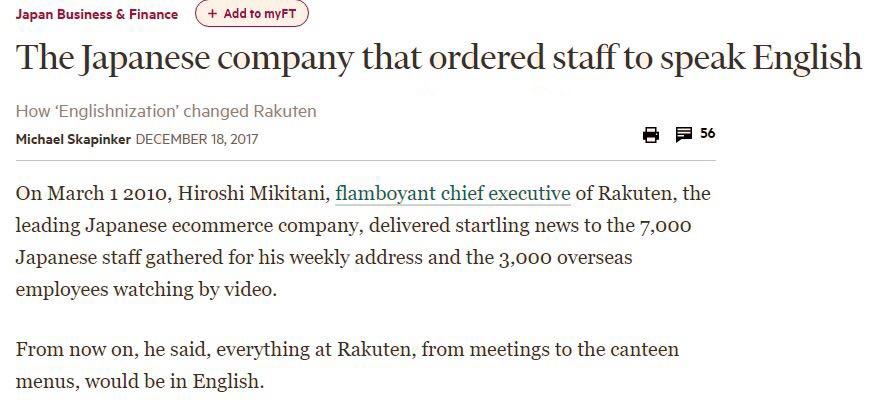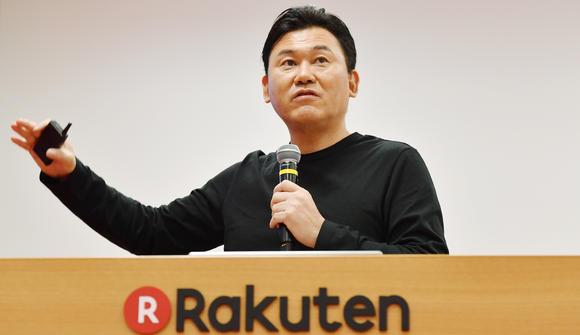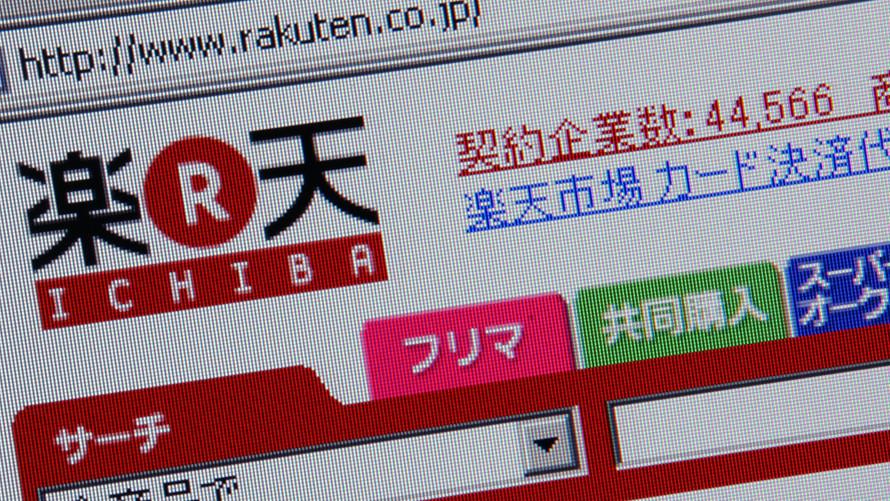
The case of ‘Englishnization’ in Rakuten, Japan
E-commerce giant Rakuten has now managed to get Japanese people to speak English competently through the implementation of the language policy called “Englishnization”. How did that work?
Language is an essential medium for communication. Receiving knowledge in different languages will broaden our horizon, enable us to think globally and increase our knowledge of other people. In the era of globalization, there is an urgent need for employees of multinationals to communicate efficiently, so that they can work together and get their jobs done. English, due to the influence of mainly American and British political, economic and cultural power, has already been used by transnational organizations for decades.
An English-only policy: “Englishnization”
In 2010, Hiroshi Mikitani, CEO of Rakuten, a Japanese e-commerce company, delivered an announcement to 10,000 employees: “From now on, everything at Rakuten, from meetings, presentations, documents to the canteen menus, will be in English.” This language policy, that embraced English as the company’s working language, was dubbed “Englishnization”. More importantly, the policy was also associated with a legal policy model, i.e. any employee who went against the policy, to be specific, who failed to pass the TOEIC (Test of English for International Communication) within two years, would receive punishment in the form of demotion.

News on Japan Business &Finance
Why “Englishnization”?
According to Mr. Mikitani, one of the problems that hold back Japanese companies from the international arena is the language barrier. “It is not just preferable, it is really critical for us to be able to do business and operate in English,” he says, “Our staff doesn’t need translators.” The aim of this language policy is to achieve global expansion and to compete with rivals such as Amazon.com and China’s Alibaba Group Holding, in which English is an essential element.
CEO of Rakuten: Hiroshi Mikitani
Cooper (1989: 45) defines language planning as “deliberate efforts to influence the behavior of others with respect to the acquisition, structure, or functional allocations of their language codes”. “Englishnization” is de facto a form of status planning, that is to say, English has communicative functionality for commerce as an international language.
The lack of English proficiency, Mr. Mikitani points out, imposes restrictions on Japan Inc. in pursuing global talent and having non-Japanese staff. Opening doors to international talent will be a game changer for the company, “the challenge posed by Japan’s declining population is well known, in this context, Japan needs more foreign talent to help sustain economic growth,” Mr. Mikitani states, “immigration and integration are vital to our future.”

Homepage of Rakuten
The past, present and future
Tsedal Neeley, an associate professor at Harvard Business School, studied Rakuten’s Englishnization policy, and wrote down the following in her book The Language of Global Success: How a Common Tongue Transforms Multinational Organizations:
“By mandating English, Rakuten was prepared to join the approximately 52 percent of multinational companies that had adopted a language different from that of their originating country in order to better meet global expansion and business needs.”
However, the Englishnization of Rakuten was actually not easy to achieve, considering that 95% of the employees did not speak English and also could not support themselves learning English. One year after the language policy was announced, TOEIC progress turned out to be dismal. To address the problem, acquisition planning was implemented, i.e. organized efforts to promote the learning of English by creating or improving opportunities or incentives to learn.
Rakuten began offering free English classes, e-learning, one-to-one help and other kinds of support to its employees. By 2015, as Neeley specified in her book, the vast majority of Japanese staff could understand the bulk of what was happening in meetings and were increasingly confident in English.
Today Englishnization is still used as the official language policy inside Rakuten. Whether the company will continue to expand successfully overseas depends on many other factors as well though. The English-only policy provides Rakuten the groundwork for a truly global mindset and a strong global future. Just like Neeley argues:
“Language can affect every aspect of global organizational life. If leaders can integrate language changes effectively, they will open untold opportunities to increase their company’s ability to maximize what is too often an unfulfilled promise of globalization. Only by learning to communicate—with words and culture—can we go forward, into the future world and work of global business .”
References
Cooper, R. L. (1989). Language planning and social change. Cambridge: Cambridge University Press.
Neeley. T. (2017). The Language of Global Success: How a Common Tongue Transforms Multinational Organizations. Princeton, NJ: Princeton University Press.